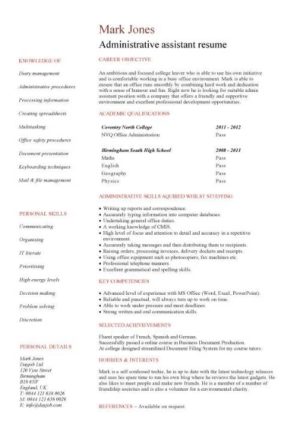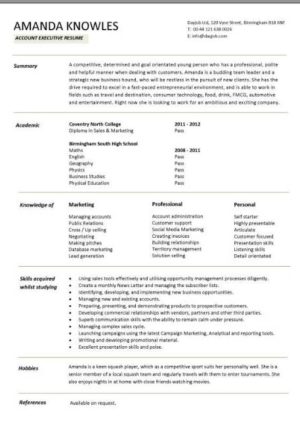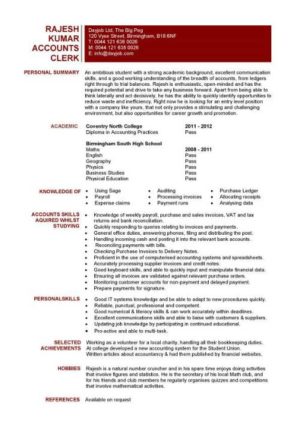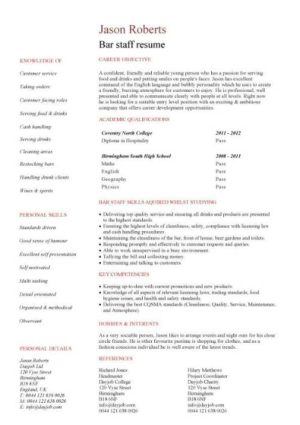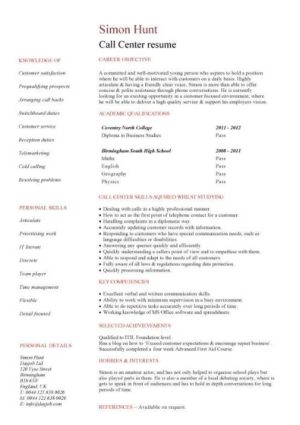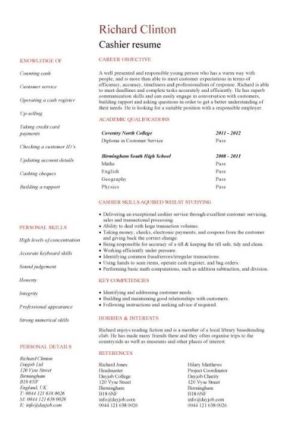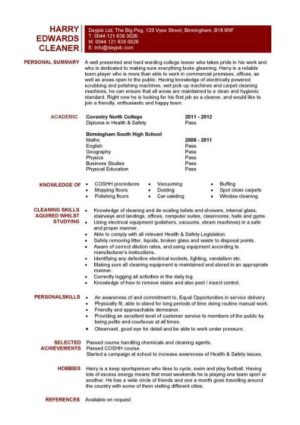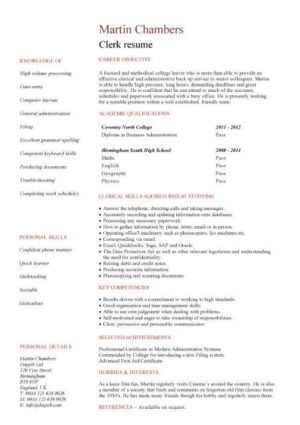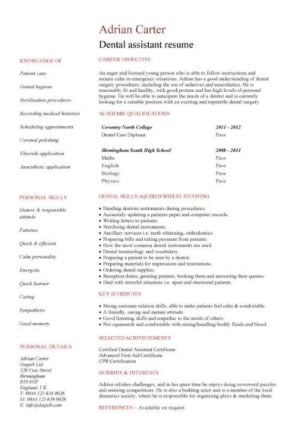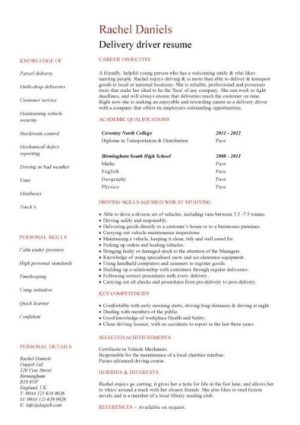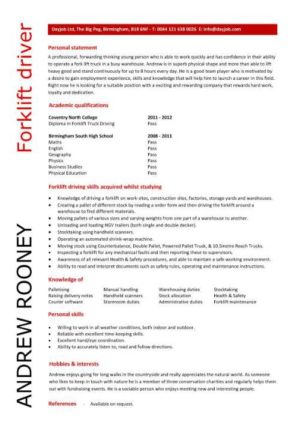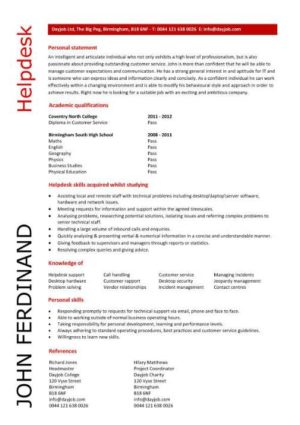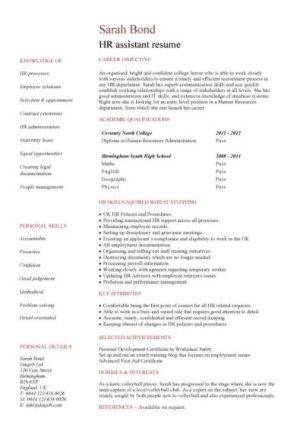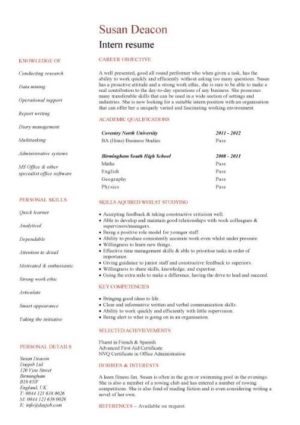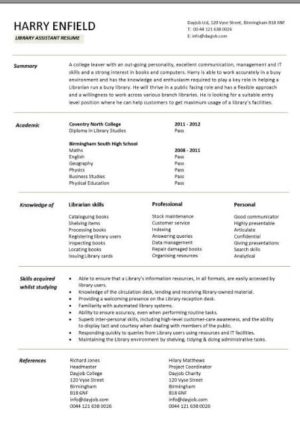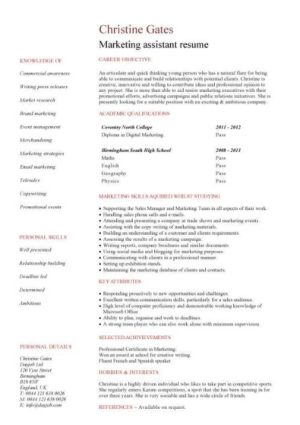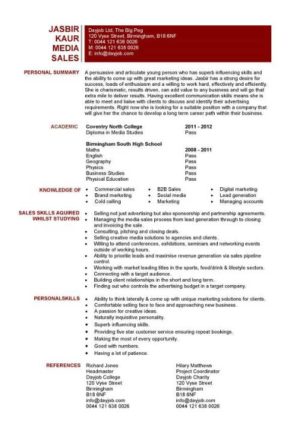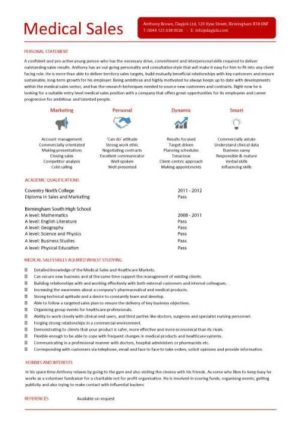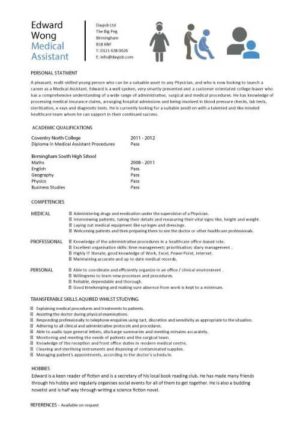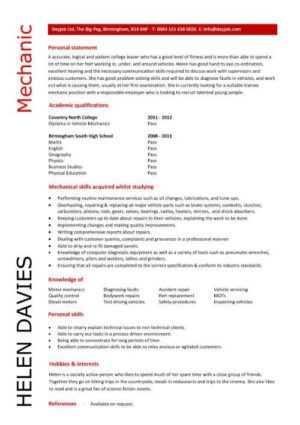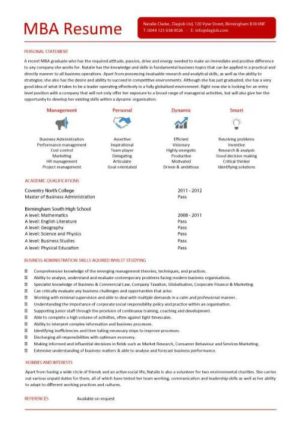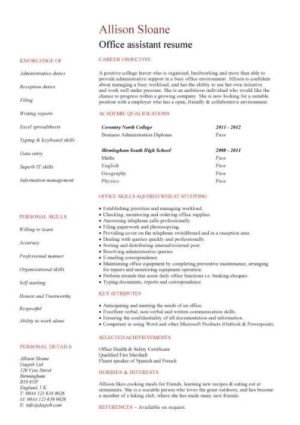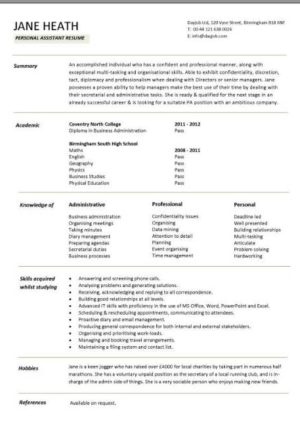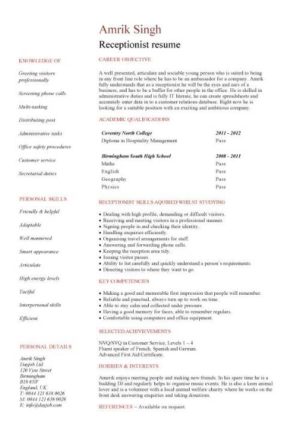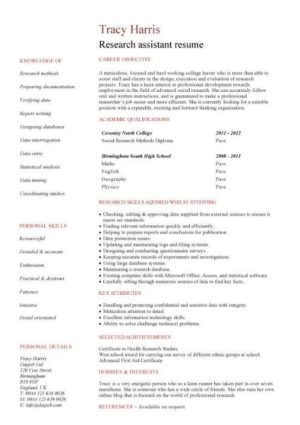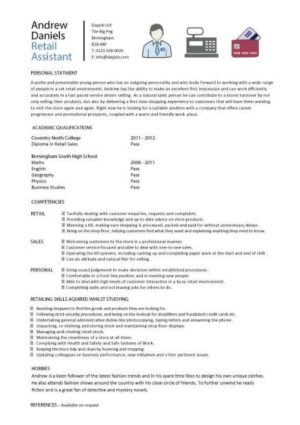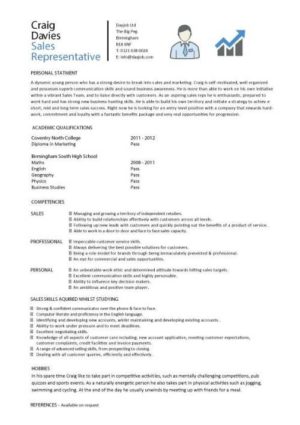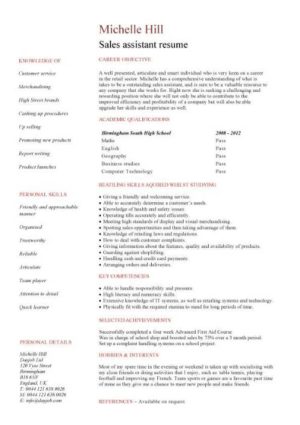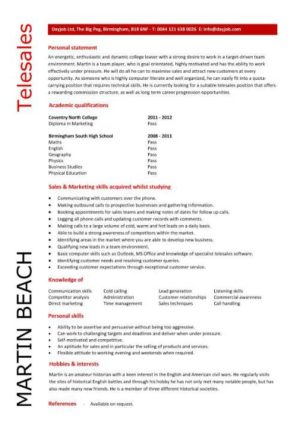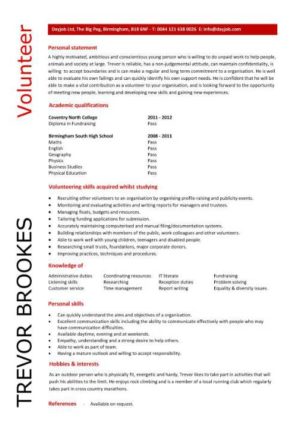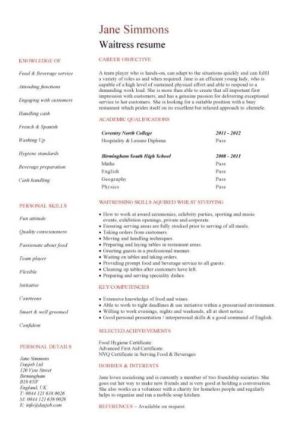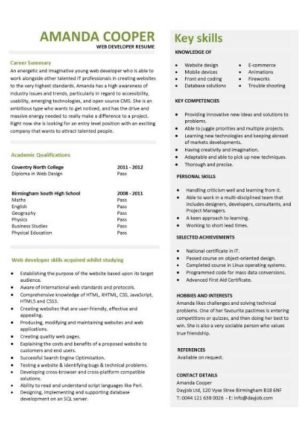Getting your first job can be one of the most difficult steps of your career.
With limited or no work experience, it’s a challenge to make an immediate impression on employers and get invited to that all important first interview. This is particularly true for young people who have just left school, college or are university graduates. However on a positive note its worth remembering that everyone has to start at the beginning. Workers with 5-10 years experience don’t suddenly appear out of thin air, they all needed an entry-level job to launch their careers.
What is an entry level resume?
A entry level resume is suitable when applying for your first ever job. Job seekers should use one to give a complete picture of themselves, they should go beyond simply showing what is required by an employer and instead demonstrate how you can make a real difference to their company. They place a great deal of emphasis on what you know, and what you’ve accomplished, rather than where you’ve worked. They are arranged around transferable skill sets and are generally suitable for people with little or no work experience, who are applying for junior or entry level roles.
Remember that your resume will be first thing a potential employer will see of you, it’s similar to shaking the hand of your interviewer and looking them in the eye. A good one can win you an interview, but a bad one can kill your job prospects stone dead.
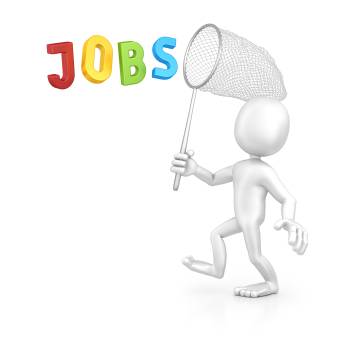
About this page
This is a resource page for young people who are looking for assistance with putting together an entry level resume. Its aim is to help them to stand out from the crowd with a high quality, clearly written and error-free document. Through our professionally written resumes and expert tips, we hope to show job applicants how to translate their school/academic accomplishments into experiences and skills that employer’s value.
The templates below present information clearly and are excellent examples of how to communicate transferable skills without having to list a career history.
There are over 50 professionally written entry level resume templates on this page, each one has been written for a specific junior or entry level position. They have been written from the perspective of an applicant who has little or no work relevant experience. Apart from giving you ideas and strategies on how to develop your own resume, these examples will also show you how to;
- Convert your academic achievements to look like job related experience.
- Clearly explain what you know, what you’ve accomplished, and the skills you possess.
- Project the right image of your experience and / or knowledge.
- Make sure that you’re most important information stands out.
- Optimize your resume for online applications by using job related and industry specific keywords.
Entry level resume examples
Below you will find professionally written entry level resumes for the following roles;
Administrative assistant
Accounting assistant
Account executive
Accounts clerk
Bartender
Bar staff
Call centre
Cashier
Cleaner
Catering assistant
Clerk
Courier
Dental assistant
Delivery driver
Data entry
Executive assistant
Editorial assistant
Forklift driver
General laborer
Graduate
Hairdresser
Helpdesk
HR assistant
Intern
IT support
Library assistant
Marketing assistant
Media sales
Medical sales
Medical receptionist
Medical assistant
Mechanic
MBA
Office assistant
Production assistant
Personal assistant
Receptionist
Research assistant
Retail assistant
Sales representative
Security guard
Sales assistant
Teaching assistant
Telesales
Truck driver
Volunteer
Waitress
Welder
Web developer
Warehouse
Free Entry Level Templates
(Get 1 + 2 page version and matching Cover Letter)
Click blue button to download
CLICK HERE Graduate and trainee templates, TO SEE MORE RESUMES WRITTEN FOR JUNIOR & ENTRY LEVEL POSITIONS.
OUR LATEST ENTRY LEVEL AND JUNIOR CV TEMPLATES;
Junior Sales Manager CV templates
Junior Sales Manager CV template
Junior Sales Manager CV template 1
Junior Sales Manager CV template 2
Junior Sales Manager cover letters
Junior Sales Manager cover letter example
Junior Sales Manager cover letter example 1
Junior Sales Manager cover letter example 2
Good news – Getting an entry level job is not hard
Companies are always looking for fresh ideas and new faces. It’s also important to note that recruiters will know that you are new to the jobs market and have no work experience. They will have factored this into any equation, which in turn means that your lack of work experience is something you do not have to explain.
Writing an Entry Level resume
The usual rules of resume writing still apply when writing a entry level one. As it is essentially a skills based document it should focus on your abilities, transferable skills and future potential. It will have a functional layout, and unlike the more common chronological formats it de-emphasizes the timeline of any career.
- A functional and skills based layout is the most suitable format for an entry level resume.
When putting one together start of by looking at the job you are applying for, make a list of its key requirements and then begin matching your relevant skills to it. Decide what your strongest selling points are, whether it is your education, IT skills, or certain experience.
The main sections of a entry level resume
- Name and address header
- Career objective
- Summary of qualifications
- Experience highlights
- Areas of expertise
- Hobbies & interests
Entry level resume career objective
Many candidates lose their readers at the beginning with a poorly written opening statement. It’s therefore vital that you quickly win them over and retain their attention with a strong, well written introductory paragraph. You have to induce a hiring manager to read the rest of your resume and the best way to do this is to professionally explain that you have the skills they are looking for, are accustomed to a professional environment and that you’ve been actively exploring your career options. A personal statement should be written based on your particular background, accomplishments and career objectives.
Examples of what to write in a resume
Below are short sentence examples of how to describe yourself your abilities and your career aims. Note that all of the sentences have been written in the third person. Use these examples as guides, and if you are going to use them then don’t forget to edit and re-write them to suit your own personal circumstances.
Introducing yourself
Examples:
‘An articulate, well presented and focused individual who would make an immediate impact on the operations of any ambitious company’.
‘A motivated, committed and high performing ……….. with a wealth of ………….. knowledge behind him’.
‘A well presented, highly personable individual, who is also hardworking and always has an upbeat and positive attitude’.
Explaining why you feel you are suitable for the job
Examples:
‘Richard strong believes he has the required qualifications, relevant ………………. experience and future potential that you are looking for in a candidate’.
‘Richard is very confident that his passion for the …………. field, together with his experience of ………… and ………….. will enable him to make a significant difference at your company’.
‘The studying he has done to date has really solidified his ambition to forge a path in …………., and he now wishes to expand his knowledge in collaboration with a company like yours.’
‘He is currently seeking a position such as yours that will immediately benefit from his extensive knowledge, high energy levels and drive.’
‘Richard has a background in ……………, and is renowned for being determined, hard working and target driven’.
‘Your vacancy is a excellent match for his academic experience, qualifications and abilities’.
Explaining why you want the job or to work in a particular industry
Examples:
‘Richard chose a career in …………… because he realised that his passion for it was the only thing that would get him out of bed on a cold grey morning’.
‘The more knowledge he gained of …………………….. the more he understood and enjoyed it’.
Describing your most relevant skills
Examples:
‘He possesses a proven track record in the fields of …………., ………………. and ……………..’
‘Having specialist knowledge of …………… and ……………., he is more than able to meet your company’s requirements in these fields.’
‘Richard has highly developed skills in ………………. and …………………., as well as a pragmatic and analytical approach to problem solving’.
‘Possessing extensive knowledge of ………… and excellent …………. skills, he is able to quickly come up with solutions of seemingly intractable problems’.
Mentioning your career aims and what job you are looking for
Examples:
‘Currently looking to work for a company that renowned for hiring exceptional people and for giving them unparalleled opportunities to build their careers and capabilities’.
‘He would like to spend the next ……… years working in the …………. field, learning as much as he can about the business, and continuing to expand his abilities’.
‘Richard is currently looking to progress in a business that can match his career aspirations’.
‘Presently searching for a suitable position with a company which will not only challenge him, but also allow him to continue to develop his knowledge and future potential’.
Explaining why you would like to work for their company
Research the company by looking for any product launches, press releases or statements on their website. Find out something interesting or positive about them and then consider using that as a reason for wanting to join them.
Examples:
‘Richard feels that working for an industry focused company such as yours will give him invaluable experience in …………., a field that he is very interested in’.
‘Richard wants to work with people who are at the top of their field and who are involved at the forefront of the industry’.
‘He wants a team player role in a people orientated organisation like yours’.
‘Eager to work for a well established company that offers a secure position with good prospects for the future’.
‘He believes that working for your company will allow him to meet and work with exceptional people from very different backgrounds and industries, all of this would help enormously in shaping his professional interests and ambitions’.
‘This is a once in a lifetime opportunity for him to work for a well known and respected company like yours’.
‘He has always been passionate about ………………………, so I would like to get involved with an organisation like yours that tackles these issues’.
‘He believes the prospects for advancement within your company are fantastic’.
‘Your new ………………… product shows a true commitment to saving the environment’.
‘Richard was greatly impressed by a recent customer case study which showed your company was very highly regarded by consumers and competitors a like’.
‘Your company has a well deserved reputation for treating employees fairly and supporting them at every opportunity’.
‘He is attracted by your company’s, its products and its portfolio’.
More tips on writing a entry level resume
The aim of a entry level resume is to;
- Convince employers to invite you to interview.
- Promote you as the perfect candidate for the opportunity at hand.
- Make your resume seem unique and appealing.
- Communicate your enthusiasm, professionalism and future potential.
- Impress them with your writing and communication skills.
- Impress them with your knowledge about their company.
- Impress them with your knowledge of their industry.
Tips when writing a entry level resume
- Arrange the resume by category, not by time.
- Give your strongest asset top billing.
- Emphasize skills and accomplishments in order of importance, rather than in order of occurrence.
- List your skills in order of importance
- Break the resume up into readable chunks by listing information in headed categories.
- Add punch to each sentence by starting it with an action verb.
- Spin any mundane tasks you performed at school, college or university into work related skills.
- Focus on describing achievements, rather than just listing duties you may have carried out.
- Restrict information to facts only. ….
- Make sure to check for spelling and grammatical errors.
Include any relevant
- Academic achievements
- Awards
- Coursework
- Certificates
- Commendations
- Extra-curricular activities (i.e. club membership)
- Educational honors
- Hobbies
- Professional licences
- Sports activities
- Studies
- Voluntary work
Give details of
- Any problems that you may have solved.
- Something you did that saved money for your college/school/university, home life or work place.
- Any processes or procedures that you streamlined.
Advantages of an entry level resume format
- Allows you to quickly highlight to a prospective employer the skills you want them to see and that they are looking for.
- You can customize your resume to the job you are applying for
- Its resume layout allows you to easily and clearly match your skills and abilities to any vacancy you are applying for. Making it easier for a Hiring Manager to scan and find key information about you, something they in turn will greatly appreciate.
- There is no need to list any prior work history.
Resume length
Keep it to one simple page. Only allow for two pages if you truly have enough work experience, publication credits or degrees to warrant it.
Show that you are
- Willing to be trained.
- Understand the job role, field or industry.
- Are committed and enthusiastic.
- Can get results and make things happen.
Keywords
Try to include industry-specific keywords in the wording. If you resume is stored on a computer database, then a recruiter will search that database using screening software to look for certain keywords. If your resume contains these keywords then it will come back in the results, if it doesn’t then it will be missed.
Write it in the third person
Write in third person, never use “I”, “me”, or “my”.
Tailoring your resume
It’s always best to write a resume that is aimed at the job you are applying for. Trying to match your resume to the job advert may take extra time and effort, but it’s definitely worth it as your chances of getting noticed will be much higher.
Tips on targeting your resume:
- Consider writing one main ‘master’ resume that you can quickly tweak, customise and target at each new job you apply for.
- Research prospective employers, find out something positive and interesting about them and then mention that in your resume.
- Research the job role, make a list of the exact duties you will be required to perform and then mention those in your resume.
- Read the job advert carefully and make notes of what is required of a candidate. Then mention these exact attributes in your resume.
Avoid
- Tiny crammed text.
- Irrelevant information.
- Using abbreviations, unless necessary.
Starting a sentence
Trying to start a unique attention grabbing sentence can be frustrating. There is a danger that if you overuse the same words it can make your resume look repetitive and tacky. You need to be able to start sentences so that they not only make you look fresh and interesting, but also show you as a positive person who knows how to present themselves in a professional way.
Listed below are various phrases you can use to start of a sentence with, they will save you having to repeatedly write something like ‘I’m very good at…’, or ‘I was required to…’ or ‘My duties included’.
- Above all else…
- Accustomed to doing…
- An experienced…
- A skilful…
- Adept at promoting…
- Aside from this…
- At the same time…
- By the same token….
- Competent in…
- Committed to…
- Contributed to…
- Coupled with this…
- Demonstrated skills in…
- Exceeded sales targets by…
- Exceptional at…
- Familiar with…
- Finally…
- Generally speaking…
- Having an ability to…
- Helped to…
- Improved the performance of…
- In addition…
- In contrast to this…
- In the final analysis…
- In conclusion…
- Instrumental in…
- Introduced a…
- Likewise I had to…
- Managed a…
- Possessing excellent…
- Proven track record in…
- Reduced costs in…
- Reliable and can be…
- Successful at…
- This led to…
- To summarise…
- To sum up…
- Was in charge of…
- Willing to…
- Working knowledge of…
- Wrote a new manual for…
Action words
These are hard hitting verbs that can be used to describe the effort you used to complete tasks. They not only give more power to your resume, but also help to highlight your strengths, abilities and accomplishments.
Tip – Try not to use the same ‘action word’ twice in a resume.
- Achieved
- Acquired
- Analysed
- Assisted
- Attained
- Built
- Carried out
- Compiled
- Completed
- Conceived
- Conducted
- Contributed
- Controlled
- Convinced
- Coordinated
- Created
- Decreased
- Detailed
- Designed
- Directed
- Dispatched
- Encouraged
- Enforced
- Established
- Evaluated
- Executed
- Expanded
- Explored
- Formulated
- Gained
- Gathered
- Helped
- Identified
- Implemented
- Increased
- Initiative
- Installed
- Instructed
- Invented
- Launched
- Led
- Maintained
- Mastered
- Modernised
- Modified
- Monitored
- Negotiated
- Operated
- Orchestrated
- Oversaw
- Participated
- Performed
- Persuaded
- Planned
- Prepared
- Presented
- Promoted
- Proved
- Proposed
- Published
- Recommended
- Reduced
- Resolved
- Restored
- Reviewed
- Saved
- Secured
- Simplified
- Solved
- Started
- Supervised
- Supported
- Tested
- Trained
- Turned around
- Willing
- Won
- Wrote
The importance of work experience
With fewer jobs and more graduates, getting as much real life work experience can make all the difference. One great way for school or college leavers to build up their CV with work experience is to get a job as a volunteer with local charities or voluntary organisations. If you have left university then you can consider undertaking a graduate placement or internship.
Advantages of work experience
- Will look good on your CV.
- It will allow you to test out a career or job role before you fully commit to it.
- You can make important contacts with decision makers in the industry of your choice.
- Allows you to put your knowledge into practise.
- You will get more real life industry specific work experience.
What are entry level jobs
These are positions for people with little or no relevant work experience in the job role or field that they are applying for. They usually require an element of coaching, meaning that a new employee might have to undertake on the job training.
Entry level jobs can be
- In the private, public or third sectors.
- Part time or full time.
Benefits of an entry level job
Gives school leavers, student or graduates the chance to gain actual work experience and thereby enhance their future employability and career prospects.
- Natural starting point for someone with no work experience.
- Requires no prior experience in the chosen field or profession.
- An ideal way to get a ‘foot in the door’ of a chosen profession.
Disadvantages of a entry level job
- The pay is typically lower than for other comparable roles.
What employers look for in a school or college leaver
- Highly valued transferable skills like communicating and teamwork.
- A positive attitude.
- Adaptability.
- Willingness to learn new skills.
Student cover letter examples
Student cover letter
Student cover letter 1
Student cover letter 2
Student cover letter 3
More template links
Cover letter examples
CV templates
Resume templates
Resume writing links
CV distribution
CV power words
Difference between CV and resume
Disclosing a criminal conviction on your CV
Explaining career gaps
Identifying your skills
Personal qualities that employers look for in candidates
Reading job adverts
Resume objective examples
Targeting your CV at specific jobs
The best font for a CV
What not to put in your CV
What is a resume
Why CVs are rejected
What employers look for in a CV
Interview links
Establishing a rapport with an interviewer
How to deal with nerves during a job interview
Interview preparation
Interview questions and answers
Interview tips
Job interview tips
Typical interview questions
What is a psychometric test
What to wear to an interview
Job hunting links
Finding a job
Standing out from the crowd
Career advice links
Becoming a social worker
Career change
Choosing a career
Career planning
Dealing with workplace stress
How to become a police officer
Job descriptions


